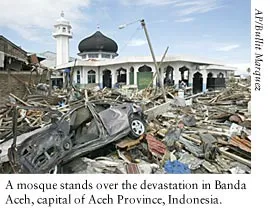|
CPJ Update
January 14, 2005 News from the Committee to Protect Journalists |
 Covering a tragedy Covering a tragedySignificant humanitarian and journalistic challenges have emerged in the aftermath of the December tsunami that devastated south Asia, claiming 110,000 lives in Indonesia alone. The Indonesian government has imposed restrictions on journalists trying to cover the hardest-hit area, the province of Aceh. Officials say that foreign journalists and aid workers must report their movements and seek military accompaniment when traveling outside of the provincial capital, Banda Aceh, or the town of Meulaboh. The rules mean a return, in part, to the severe restrictions that have limited coverage of the ongoing civil conflict in Aceh. “Unrestricted access to information is absolutely crucial during this relief effort,” CPJ Executive Director Ann Cooper said in statement we issued Thursday. “The world has been moved by Aceh’s terrible plight and has a deep interest in keeping abreast of the assistance efforts.” We are seeking a meeting with the country’s U.S. ambassador in an effort to overturn these deeply troubling limitations. Following on a news alert we issued this week describing the new restrictions, we are sending a letter today to Indonesian officials. To read our news alert: http://www.cpj.org/news/2005/Indonesia13jan05na.html To read our letter to Ambassador Soemadi D.M. Brotodiningrat: http://www.cpj.org/protests/05ltrs/Indonesia14jan05pl.html And helping our colleagues The paper, widely praised for its coverage of the region’s separatist rebellion, has been menaced by both rebels and government security forces. The staff’s commitment was demonstrated yet again in early January: Despite the tragedy and its terrible toll on the staff, Serambi Indonesia published a special edition with the help of colleagues in Lhokseumawe, Aceh’s second-largest city. CPJ has started a fund to aid Indonesian journalists and their families. All donations will be sent directly to journalists and press organizations in Indonesia. To donate, contact Elisabeth Witchel, CPJ’s journalist assistance coordinator, at [email protected]. Murder top cause of work deaths In Iraq, where crossfire was the leading cause of death among journalists, at least nine of the 23 journalists killed were deliberately targeted. As we reported in December, the 2004 death toll is the highest in a decade. The deadliest year for journalists since CPJ began compiling detailed statistics was 1994, when 66 journalists were killed, mostly in Algeria, Rwanda, and Bosnia-Herzegovina. To read more: http://www.cpj.org/news/2005/USA03jan05na.html New year, new attacks In Colombia, gunmen killed a veteran radio host on January 11 in the city of Cúcuta. We are investigating the murder to determine whether it was related to his journalism. Colombia has long been a dangerous place for journalists, although in 2004 no journalist was killed for his or her work in Colombia for the first time in at least a decade. Development news |
 French journalist Florence Aubenas and her translator are believed to have been kidnapped in Iraq, President Ghazi al-Yawar said this week. The two, who went missing on January 5, would be the first members of the press to be kidnapped in Iraq in 2005. Twenty-two journalists were abducted in the country last year, when CPJ named Iraq the world’s most dangerous place for journalists. We continue to investigate Aubenas’ disappearance.
French journalist Florence Aubenas and her translator are believed to have been kidnapped in Iraq, President Ghazi al-Yawar said this week. The two, who went missing on January 5, would be the first members of the press to be kidnapped in Iraq in 2005. Twenty-two journalists were abducted in the country last year, when CPJ named Iraq the world’s most dangerous place for journalists. We continue to investigate Aubenas’ disappearance.